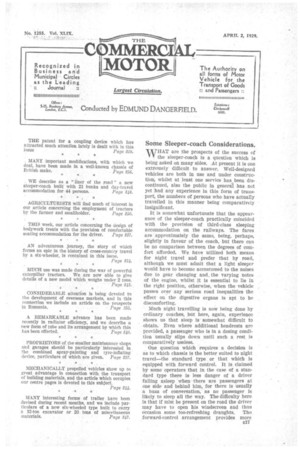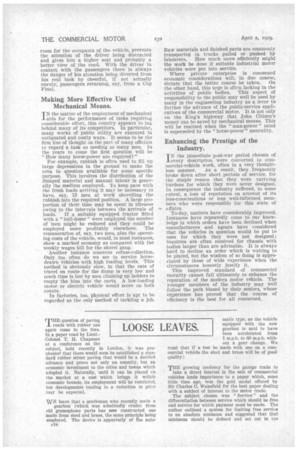Some Sleeper-coach Considerations.
Page 39

Page 40

If you've noticed an error in this article please click here to report it so we can fix it.
WHAT are the prospects of the success of V V the sleeper-coach is a question which is being asked on many sides. At present it is one extremely difficult to answer. Well-designed vehicles are both in use and under construction, whilst at least one service has been discontinued, also the public in general has not yet had any experience in this form of transport, the numbers of persons• who have actually travelled in this manner being comparatively Insignificant.
It is somewhat unfortunate that the appearance of the sleeper-coach practically coincided with the provision of third-class sleeping accommodation on the railways. The fares are approximately the same, being, perhaps, slightly in favour of the coach, but there can be no comparison between the degrees of comfort afforded. We have utilized both means for night travel and prefer that by road, although we must admit that a light sleeper would have to become accustomed to the noises due to gear changing and, the varying notes of the engine, whilst it is essential to lie in the right position, otherwise, when the vehicle passes over any serious road inequalities the effect on the digestive organs is apt to be discomforting.
• Much night travelling is now being done by ordinary coaches, but here, again, experience shows us that sleep is somewhat difficult to obtain. Even where additional headrests are provided, a passenger who is in a dozing condition usually slips down until such a rest is comparatively useless.
One question which requires a decision is as to which chassis is the better suited to night travel—the standard type or that which is equipped with forward control. It Is claimed by some operators that in the case of a standard type there is less danger of a driver falling asleep when there are passengers at one side and behind him, for there is usually a buzz of conversation, as no passenger is likely, to sleep all the way. The difficulty here Is that if mist be present on the road the driver may have to open his windscreen and thus occasion some too-refreshing draughts. The forward-control arrangement provides more room for the occupants of the vehicle, prevents the attention of the driver being distracted and gives him a higher seat and probably a better view of the road. With the driver in contact with the passengers there is always the danger of his attention betty, diverted from his real task by cheerful, if not actually unruly, passengers returning, say, from a Cup Final.
Making More Effective Use of Mechanical Means.
TN the matter of the employment of mechanical _Laids for the performance of tasks requiring considerable effort, this country appears to lag behind many of its competitors. In particular, many works of public utility are executed in antiquated and costly ways. It seems to be the first line of thought on the part of many officials to regard a task as needing so many men. In the years to come the first question will be "How many horse-power are required?" For example, rubbish is often used to fill up large depressions in the ground to make the area in question available for some specific purpose, This involves the distribution of the dumped material and manual labour is generally the medium employed. To keep pace with the fresh loads arrivingit may be necessary to have, say, 15 men at work shovelling the rubbish into the required position. A large proportion of their time may be spent in idleness owing to the intervals between the arrivals of loads. If a suitably equipped tractor fitted with a " bull-dozer " were employed the number of "men might be reduced and they could be employed more profitably elsewhere. The remuneration of, say, two men, plus the operating costs of the vehicle, would, in most instances, show a marked economy as compared with the weekly wages bill for the shovel gang, -Another instance concerns refuse-collection. Only too often do we see in service horsedrawn vehicles with high loading levels. This method is obviously slow, in that the rate of travel en route for the dump is very low and much time is lost by men climbing up ladders to empty the bins into the carts. A low-loading motor or electric vehicle would score on both counts. In factories, too, physical effort is apt to be regarded as the only method of tackling a job. Raw materials and finished parts are commonly transported in trucks pulled or pushed by labourers. How much more efficiently might the work be done if suitable industrial motor vehicles were put into service. Where private enterprise is concerned economic considerations will, in due course, dictate that the better course be taken. On the other hand, this urge is often lacking in the activities of public bodies. This aspect of responsibility to the public may well be used by many in the engineering industry as a lever to further the advance of the public-service applications of the commercial motor. It is not only on the King's highway. that John Citizen's money can be saved by mechanical means. This -will be realized when the " man-power " mind is superseded by the " horse-power " mentality.
Enhancing the Prestige of the Industry.
IN the immediate post-war period chassis of every description were converted to commercial-vehicle work, often in a very thought less manner. AS a result, they frequently broke down after short periods of service, for the simple reason that they were carrying burdens for which they were never designed. In consequence the industry suffered, to some extent, a loss of reputation on account of its less-conscieutious or less well-informed members who were responsible for this state of offairs. To-day, matters have considerably improved. Instances have repeatedly come to our knowledge in which orders have been declined when manufacturers and agents have considered that the vehicles in question would be put to uses for which they were not designed; inquiries are often received for chassis with bodies larger than are advisable. It is always hard to decline an order which is waiting to be placed, but the wisdom of so doing is appreciated by those of wide experience when the circumstances honestly justify it. This improved standard of commercial morality cannot fail ultimately to enhance the reputation of the modern motor vehicle. The younger members of the industry may well follow the path blazed by their seniors, whose experience has proved that the course of efficiency is the best for all concerned.












































































































